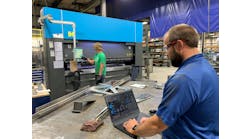|
T |
hroughout my career in automation which has spanned 26 years I have heard the people who work in this industry called many things some unprintable but others all too easily de-humanized - resources and assets to name a couple. But lets remember that these are people fathers, sons, husbands, grandfathers and are too often dismissed as a necessary evil in making our processes work. It is said that an airliner can fly without a pilot these days but would you climb on board if there was no pilot or if the pilot in charge was in training. Likewise I have been in a chemical plant when the skills of an operator have been truly needed during an emergency!! In these days of outsourcing and rightsizing I believe that we underestimate the value of our people and the inherent skills they possess.
Process automation helps in both of these cases but removing the people completely is unthinkable. It is often the case that accidents are caused by human error. Which comes back to another aspect that I have seen mismanaged during my career - training and certification often an easy target for cost cutting. Stress, overwork, understaffing and a lack of training and certification are all problems that lead to human error in fact this is borne out by statistics.
I recently heard on the radio that a grocery chain in the Northeast USA - Wegmans - has been voted by Fortune magazine as the best company to work for. There was an interview with the chairman who spends a lot of time out in his stores understanding the needs and issues of the people and managers in his business. He spends time working with his people when was the last time you saw your CEO?
I have often heard that automation eliminates jobs in industry and in some cases that may be true. In my experience though, automation CHANGES jobs it provides more information, better analytical tools, better safety and many more things and actually provides jobs but maybe elsewhere in the enterprise.
WBF has become a place where people discuss the human aspects of automation. In fact our members have said that the networking at our conferences is one of the best aspects. For instance at the WBF North American Conference in 2004, some of the key presentations addressed various aspects of the human condition as it relates to our industry.
- Skip Holmes gave a keynote presentation discussing how Babbel or tech-speak often confuses him (and other senior managers). He explained how engineers need to get on the management surfboard to get their point over when asking for new investment tech speakâ¦.
- Jordan Corn gave an insight into how new technology is either accepted or rejected by US consumers. Sometimes its an answer to a prayer other times, its just good marketing and a message that sticks.
- Jim Parshall showed how respecting team members and good planning and training on a project can have a remarkable impact on its success. Strange eh?
To this end both of the keynote speeches at this years WBF North American conference (May 15-18, Atlantic City, NJ) continue to address human factors.
Dave Beckmann a former VP with Emerson, now retired, will present Leadership at Its BestFrom Success to Significance. Dave firmly believes in the value of people and the absolute necessity of good leadership, and their importance in the success of companies involved in the process control industry. Over the years, he has become more of a motivational speaker as opposed to providing heavy emphasis on the technical. This shift has evolved through his personal observations. He has noted that companies that value people succeed, while those who merely use people eventually fade.
Ian Nimmo President, User Centered Design Services LLC will deal with The Safety Issues of Batch (and Other) Control. Ian has been a key contributor to and was one of the founding members of the Abnormal Situation Management consortium. He will review a history of batch control and look into what the future may bring and how the role of people has changed over time. He will discuss a new approach to safety, breaking the traditional barriers of people, organizations and culture, and will put the control engineer in the driving seat again for performance improvementsoptimizing not just control algorithms, but people and the way they interface with technology.
To those reading this some advice. Treat the people who work with you and for you as you would want to be treated yourself. To managers reading this please look at the people working for your business as a potential for adding value not a potential for saving costâ¦.but please also provide them with the support, training and tools that they need to do a good job.
If you would like to comment on this or ask questions, please contact me.
NOTE: The views and opinions expressed in this article are my own and have no connection with past or present employers or organizations to which I belong.Maurice Wilkins is Chairman of the World Batch Forum and can be reached by e-mail at [email protected].




